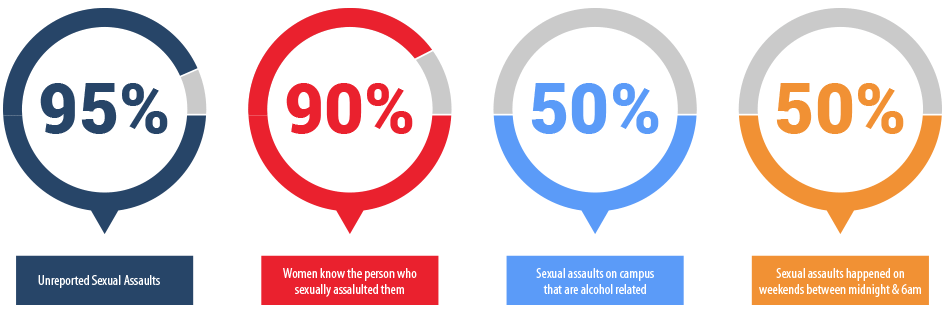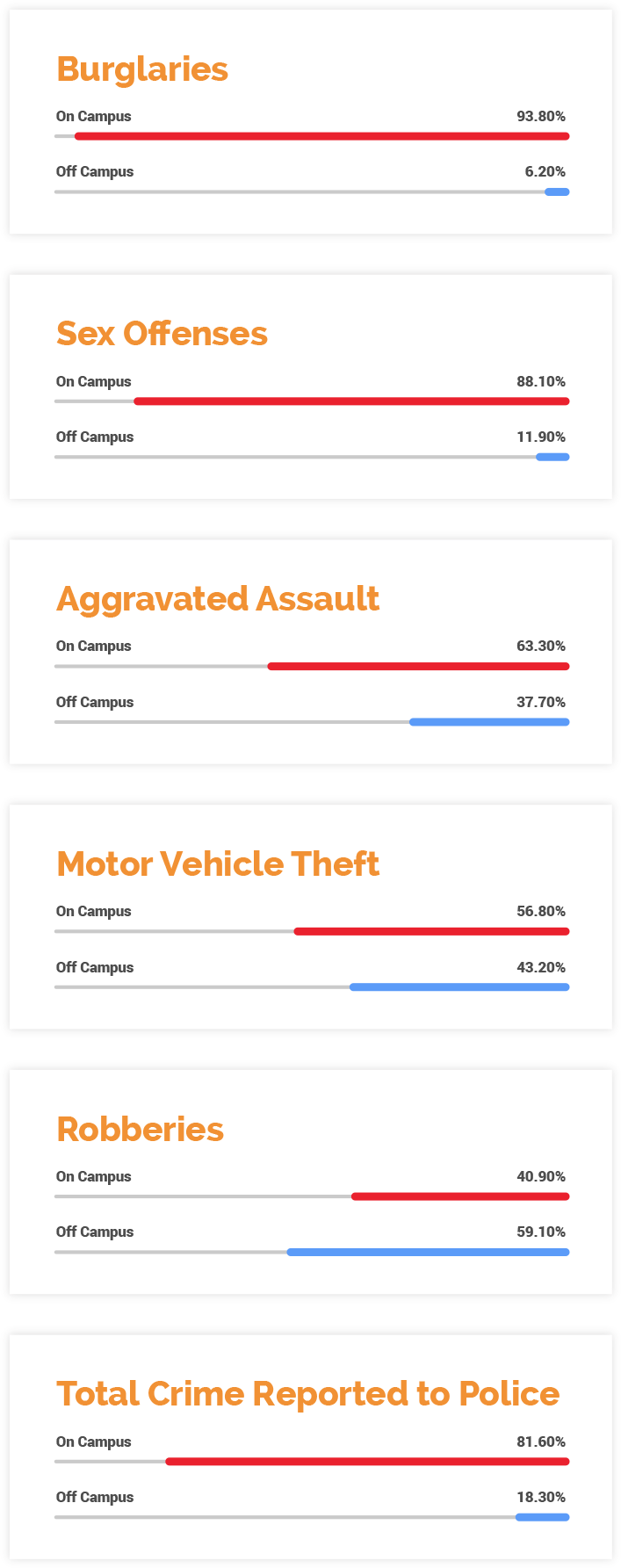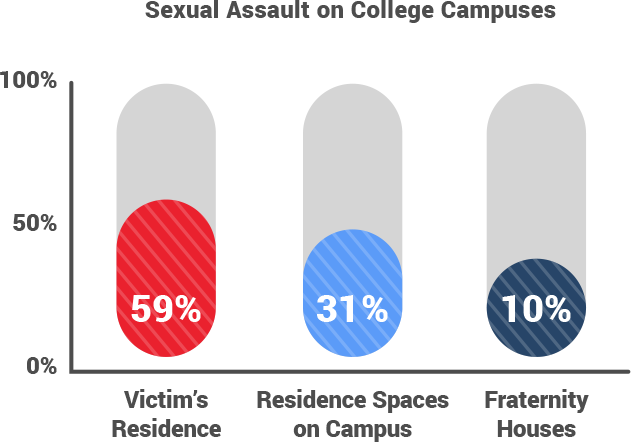


JoAnn Buttaro is a Public Speaker and Advocate for Sexual Assault awareness. A date rape survivor who successfully completed counseling & treatment for PTSD seeing her attacker through two trials resulting in convictions for sexual assault, rape and a Life sentence.
College is an exciting time for most, because it is the start of a new milestone for millions of recent high school graduates and returning students. College is a time where people get to experience new things, new people, new experiences and new environments!
While all of this sounds like fun and games, let’s not forget about the importance of staying safe in and out of the classroom and on and off campus. Personal safety and security on campus have been significant concerns for both students and parents across the country, regardless of which college you attend.
Here at CollegeStats.org, we wbuilt this guide to educate both students and parents with important information, current statistics, and useful guidance on the subject of college campus safety and sexual assault awareness. By being aware of your surroundings and knowing how to react in a dangerous situation, you will be one step ahead when staying safe.
The first step toward college campus safety is being fully informed on the subject of sexual assault and what it means. The formal definition of Sexual Assault: Sexual assault is any involuntary sexual act in which a person is coerced or physically forced to engage against their will, or any non-consensual sexual touching of a person. Sexual assault is a form of sexual violence, and it includes rape, groping, forced kissing, child sexual abuse, or the torture of the person in a sexual manner.
Simply put: “An incident that involves sexual contact that is forced on somebody”. For example: “Sexual activity” could be anything from kissing, groping, oral and vaginal rape, and exhibitionism. Victims may be forced into sexual acts through verbal or nonverbal threats, through the use of alcoholic beverages, drugs or even physical violence.
The Rape, Abuse, and Incest National Network (RAINN) indicates that many victims know their assailant or rapist. In fact, most of these attacks are perpetrated by someone familiar. The RAINN study shows that approximately 38% of rape incidents are committed by a friend or acquaintance of the victim.
Unfortunately, many victims fail to report sexual assaults for a variety of reasons:
The Sociological Cinema indicates the following statistics regarding sexual assaults in college:

You might be wondering: How do I stay safe on campus with so many students, faculty and visitors walking in and out of classrooms and buildings in and around campus? Before we delve in too deeply, let’s first take a look at what types of college crimes are typically reported. The below chart demonstrates the national statistics on campus crime during the 2012 academic year, broken down by type of assault and the percentages of the crime rates on and off campus.

As you can see, a majority of assaults are sex-related and take place on campus. Burglaries on campus are also a big issue, which is why students must remember to keep their belongings safe, windows closed and doors locked when they are home alone or have left their dorms. As far as off-campus crimes, personal property crimes are a significant problem. By securing your belongings and keeping your home locked you will further ensure your safety. Motor vehicle theft can also be a serious issue. By putting away valuables so that they aren’t visible and enticing you will be protecting yourself and your vehicle from theft.
Sexual violence is present in many forms. Below are just a few common types of sexual violence that students should be aware of and some quick tips on how you can avoid them. 12.7 million women and men are physically abused, raped or stalked by their partners in a year. (NoMore.org website)
Sense someone following you frequently? You might want to speak with authorities. While it may not start off as malicious, it could develop to a lot more. By walking with friends or in a crowd, the chances of you getting hurt can lessen.
Any sort of force and foul play should not be tolerated by anyone. If you or someone you know is experiencing any sort of coercion, it’s time to speak to an authority figure.
Sexual assault can involve anything from kissing, foul play, or penetration without permission from the victim. It typically involves some sort of coercion, even if the victim is trying to fight him or herself off.
The crime of Rape can occur anywhere in a public place or a private home and committed by anyone familiar or unknown. Be alert and be aware all the time and trust your instincts because if something doesn’t feel right then it probably isn’t.
This form of rape occurs when the victim is in a vulnerable state and is not able to know what is happening or remember afterward. Be responsible when consuming alcoholic beverages, keep an eye on your drink at all times and abstain from drugs. If you feel you’re in an uncomfortable situation do your best to remove yourself or call for help if necessary.
Friends, boyfriends, someone you thought you trusted can commit rape. We want to be trusting but those closest to us can also be a potential rapist. This is why it’s important to stand your ground at the early stages and say no to potentially dangerous situations. If you’re on a first date, make sure to set the expectations and your intentions well beforehand and don’t feel pressured to do something you’re not comfortable doing.
If you feel that your significant other is forcing you to have sex without your consent, then it is “partner rape.” This is an unhealthy relationship and should be terminated as soon as possible, seek help if needed. Reach out to a friend, roommate, school counselor or trusted professor.
If you feel that your relationship is not necessarily dangerous, but you still feel uncomfortable, then it is time to communicate effectively and set expectations with your significant other so that both people have a mutual understanding of set boundaries.
Sexual Assault is a traumatic form of violence like no other. Survivors should always do what they can to stay safe and preserve physical evidence for the police. Below are some basic tips on what to do after a Rape or Sexual Assault.
Being somewhere safe is the first step, then you can talk with someone, (anyone you’re comfortable with be it a roommate, friend, coworker, advisor, etc.) gather your thoughts and emotions, and figure out your next steps with peace of mind that you are away from the threat.
Don’t be afraid to reach out to someone trustworthy for help. Again this is dependent upon the comfort level of the victim. If you feel you can’t speak with anyone close to you then reach out to a Rape Crisis Counselor. They are specially trained in the follow up treatment of a rape or sexual assault victim:
In addition to friends and family, a legal professional can also help you with the potential criminal case against your attacker. Contact campus police, local police or SVU.
There are several precautionary tactics students can practice to reduce risks and increase their sense of security. The following are steps for students to consider:
Self-defense is not only a good practice for your health, it’s also a great way to protect yourself when needed. It trains people on awareness. Self-defense classes can be taken at your local recreational or community center or YMCA. Some colleges also have self-defense courses for students to take.
If you’re away from home, it’s always a good idea to let your friends or family know where you are and where you will be. This way, they won’t worry that you went missing unwillingly.
Most colleges offer a complimentary campus escort service. This is designed to help students feel safe, and also to promote campus safety. Take advantage of it!
Stalkers are out there, more easily now with people being so openly available to be located through social media. Consider making your profile private or don’t tag locations to photos you post online until you’re no longer at the location. This way, people won’t know where you are and not unable to locate and threaten you.
If you’re going to be in a dangerous situation, you’ll definitely need a means to fight off the assailant. A whistle will be great for getting the attention of others and calling for help, while pepper spray comes in handy if you don’t necessarily have self-defense skills. If it’s your first time using pepper spray, familiarize yourself with it in an open area with no people around to make sure it works properly.
Sexual assault can happen anywhere on or off-campus. This is why it is extremely important to be vigilant of your surroundings at all times.

See below for tips on how you can stay safe in your dorm or apartment, on-campus, off-campus, and at social events.
Just because you’re in your campus dorm or apartment does not mean that you are completely safe. Keep these tips in mind to ensure safety in your living space:
Even when you’re on campus with a ton of other students, it’s still important to be aware of your surroundings. Stay alert as you walk and stay in areas that other student’s frequent as well. Attackers are less likely to go for someone in a busy area knowing there are many others around. It’s about vulnerability and accessibility to them.
Almost all the same applies when a student ventures off-campus, know the “safer routes” to take when you go out. It’s always a good idea to take a friend with you whenever possible.
The Department of Community Medicine from Wayne State University shows that many sexual assaults are direct results of alcohol consumption:
With all this in mind, it’s important to do everything you can to be responsible in any social setting. Here are just some ways you can help yourself and others:
With technology on the rise, it never hurts to have a few safety applications on hand in your phone in case of an emergency. Here are a few useful apps that are resourceful and equipped with a number of different capabilities. They are free to download from your phone’s App Store.
Being sexually assaulted will change a person forever. It is a sensitive, personal subject, and if a friend has opened up and confided in you about their recent sexual assault, then you must do your best to make them feel safe and stable, and guide them to the right resources for help as needed. Here are just some things to keep in mind.
After a sexual assault, victims will likely struggle with resuming to their "normal life." This is why it is critical for them to be in touch with their physicians, counselors and instructors to take some time off, if necessary, from classes and other academic responsibilities to properly heal. Not only are there physical wounds that may need healing, there’s also the emotional and mental aspect to consider. Victims may experience physical, emotional and mental trauma following a Rape or Sexual Assault. Including:
As you can see, there is serious trauma that victims may experience after a sexual assault. This is why it is extremely important for these victims to seek professional help. Even if he/she may feel like counseling is not needed, results from the emotional and mental trauma can quickly catch up to her/him. College is stressful enough, so help is always within reach and highly encouraged. There are many support systems on campus in place to help victims get through this tough period.
Let’s take a look at the frequency of major depressive episodes by victimization status:

Studies have shown that victims of sexual assault are much more likely to experience depressive episodes on a daily basis and throughout their lifetime compared to those who are not victims. The Mental Impact of Rape demonstrates that rape survivors are 6.2 times more likely to develop PTSD, 3 times more likely to experience a major depressive episode, 13 times more likely to abuse alcohol, and 26 times more likely to abuse drugs.
Students can reduce their risk of exposure to Sexual Assault and Campus Crimes when provided with information and preventative tools. College can be stressful and difficult enough with so many classes to juggle and extracurricular activities to take part in. Help yourself and those around you become familiar with how to reduce risks by practicing the safety tips outlined in this guide.
If you’re looking for other helpful resources to help you familiarize with sexual assault, these websites below will come in handy:
Title IX of the Education Amendments of 1972 was created to protect students from discrimination on the basis of sex which can include sexual harassment and sexual violence. Every school receiving funding from the federal government must abide by Title IX, by responding effectively to any situations of sexual harassment and to put in measures to prevent a recurrence. Every school must administer a policy stating it does not discriminate on the basis of sex, and the school must have a Title IX coordinator. Under Title IX the student must be notified of the time frame of the investigation and of the outcome. If you feel you have been sexually discriminated against at your school, then there are several resources available to you.